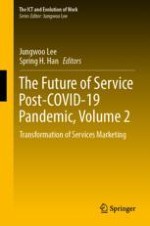2021 | OriginalPaper | Chapter
5. Impact of COVID-19 on People-Processing vs. Information-Processing Services: Case of Food Service and Banking Industries
Authors : Misra Cagla Gul, Mehmet Kaytaz
Published in: The Future of Service Post-COVID-19 Pandemic, Volume 2
Publisher: Springer Singapore
Activate our intelligent search to find suitable subject content or patents.
Select sections of text to find matching patents with Artificial Intelligence. powered by
Select sections of text to find additional relevant content using AI-assisted search. powered by
